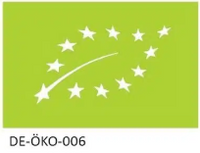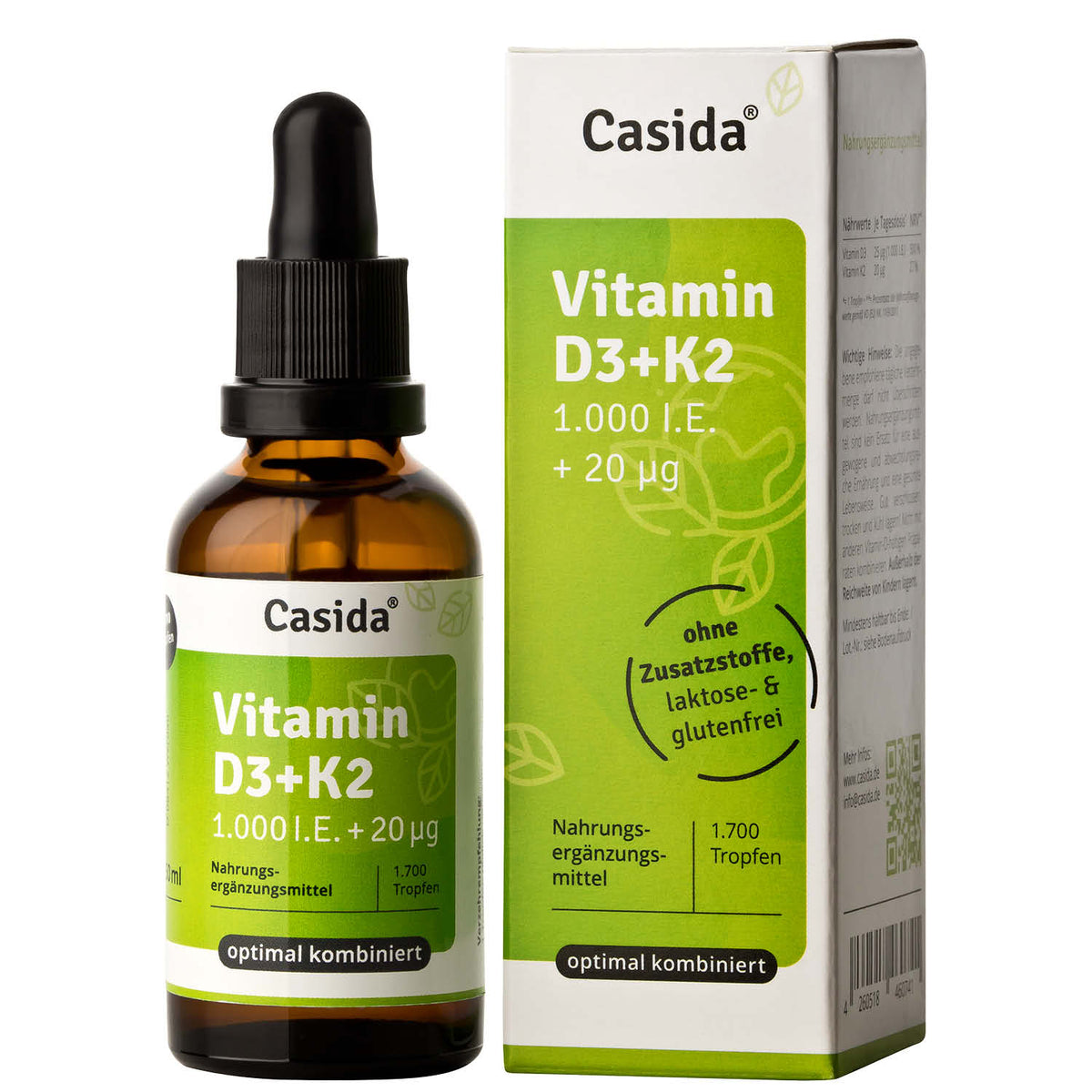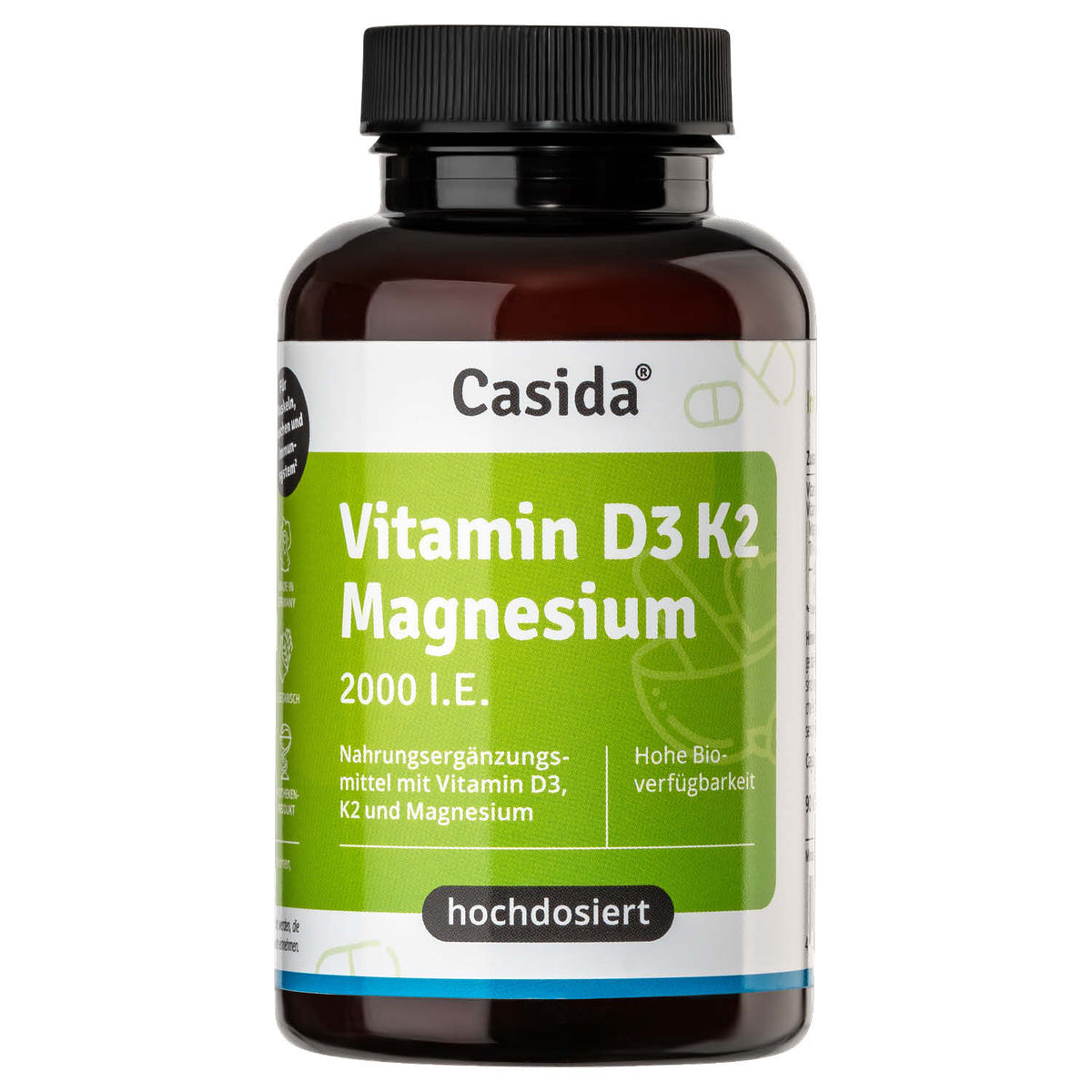Inhaltsverzeichnis
Immer mehr Menschen sind von Knochenproblemen betroffen. Was viele aber nicht wissen: Vitamin K ist in solchen Fällen genau die richtige Lösung. Vitamin K verhindert das Ablagern des Kalziums in den Arterien und sorgt dafür, dass das Kalzium für den Aufbau der Knochen genutzt wird. Damit wird einem Herzinfarkt vorgebeugt, aber auch der Osteoporose.
Was ist Vitamin K?
Wegen bekannten Vitaminen, wie beispielsweise Vitamin C, steht Vitamin K eher im Hintergrund. Dabei ist seine Rolle im Körper nicht weniger wichtig, denn ein Vitamin K2 Mangel wäre gefährlich. Neben den Vitaminen A, D und E zählt auch Vitamin K zu den fettlöslichen Vitaminen. Es bewegt sich also innerhalb des sogenannten LDL-Moleküls und anderen Lipoproteinen. Vitamin K wurde im Jahr 1935 entdeckt, als Wissenschaftler dieses als einen lebensnotwendigen Nährstoff erkannten.
Unter dem Begriff Vitamin K ist die Kombination zwischen Vitamin K1 (Phyllochinon) und Vitamin K2 (Menachinon) zu verstehen. Während Vitamin K1 vor allem in Grünpflanzen zu finden ist, wird Vitamin K2 von Bakterien wie E. coli produziert und trotz der gleichen Wirkung als aktivere Form des Vitamins betrachtet. Im Darm wird das Vitamin K resorbiert und zur Leber transportiert.
Interessant: Früher wurde ein Vitamin K2 Mangel mit dem synthetischen Vitamin K3 Menadison behandelt. Aufgrund seiner schädlichen Nebenwirkungen u.a. auf die Leber ist es jedoch nicht mehr zugelassen. Bei Vitamin K2 Mangel können heutzutage Kombipräparate mit Vitamin D und K helfen. Als Apotheker empfehlen wir hochwertige Vitamin D3+K2 Tropfen aus der Apotheke, die bioverfügbar, laborgeprüft und wirksam sind.
Was gehört zum Aufgabenbereich von Vitamin K?
Osteoporose und Arteriosklerose treten bei den meisten erst im höheren Alter auf und haben auf den ersten Blick nichts gemeinsam. Erst bei einem Knochenbruch oder einem Herzinfarkt spürt man die Erkrankungen. Bei der Erforschung von Vitamin K2 wurde festgestellt, dass es neben der Stärkung der Knochen und dem Sauberhalten der Arterien auch vielen Zivilisationskrankheiten vorbeugen kann.
Vitamin K2, das teilweise im Darm produziert wird, steuert Kalzium durch die Aktivierung der GLA-Proteine. Diese Proteine sorgen dafür, dass das aufgenommene Kalzium in den Knochen gebunden und Ablagerungen von Kalzium in den Arterien verhindert werden. In diesem Fall könnte ein Vitamin K2 Mangel zu Problemen mit Knochen und verstopften Arterien führen. Vitamin K2 Mangel könnte ebenfalls die Ursache für das Problem Blutgerinnung sein.
Die Rolle von Vitamin K im Körper sollte daher nicht unterschätzt werden, denn es erfüllt eine Vielzahl an Funktionen. Hier sind die wichtigsten bekannten Aufgaben von Vitamin K übersichtlich aufgeführt:
- Zu den Hauptaufgaben von Vitamin K im Körper gehört Blutgerinnung. Ohne Vitamin K können im Körper keine Gerinnungsfaktoren hergestellt und Blutungen gestoppt werden.
- Zu weiteren Aufgaben von Vitamin K gehört das Verhindern von Kalkablagerungen in Blutgefäßen und Knorpeln.
- Vitamin K-abhängig ist auch die Regulation von Zellprozessen.
- Vitamin K hilft bei Reparaturprozessen in Leber, Nieren, Nervenzellen, Blutgefäßen und Augen.
- Dank Vitamin K wird der Knochenabbau bei Frauen nach den Wechseljahren gehemmt.
- Generell sorgt Vitamin K für den Erhalt normaler Knochen. Vitamin K kann sowohl das Wachstum der Knochen in jungen Jahren beschleunigen als auch den Abbau im höheren Alter verlangsamen. Vitamin K2 sorgt für einen hohen Mineralstoffgehalt in unserem Knochengewebe, das für feste und starke Knochen sorgt. Ohne Vitamin K2 funktioniert der Kalziumstoffwechsel nicht und der Mineralstoffgehalt nimmt ab. Darauf können Knochen porös werden.
- Vitamin K verringert das Risiko, an Osteoporose zu erkranken. Bei einem Vitamin K2 Mangel wird das Kalzium nämlich nicht in den Knochen eingelagert und auf diese Weise kommt es zur Osteoporose.
- Einigen Untersuchungen nach soll Vitamin K positive Auswirkungen auf das Erinnerungsvermögen haben, vor allem im höheren Alter.
- Vitamin K soll auch gegen Bluthochdruck und andere Herz-Kreislauf-Erkrankungen helfen.
- Durch einen Vitamin K2 Mangel kommt es zu Kalziumablagerungen in unseren Arterienwänden, was die Nieren und das Gehirn negativ beeinflussen kann.
Wie viel Vitamin K wird täglich benötigt?
Der Tagesbedarf an Vitamin K wird von der Deutschen Gesellschaft für Ernährung (DGE) empfohlen, während die Werte in anderen Ländern etwas höher liegen. Bei diesen Dosierungen dürfte es zu keinem Vitamin K2 Mangel kommen. Laut der DGE ist der Bedarf an Vitamin K vom Alter sowie Geschlecht abhängig und fällt für die verschiedenen Gruppen unterschiedlich aus*:
- Die empfohlene Tagesmenge für Jugendliche ab 15 Jahren und Erwachsene abhängig von der Altersstufe und dem Geschlecht beträgt zwischen 60 und 80 Mikrogramm.
- Schwangere und Stillende dürfen bis zu 60 Mikrogramm Vitamin K am Tag zu sich nehmen.
- Bei Kindern je nach Altersstufe beträgt die empfohlene Tagensmende an Vitamin K zwischen 15 und 50 Mikrogramm.
- Die erforderliche Menge an Vitamin K pro Tag bei Babys im ersten Lebensjahr liegt zwischen 4 und 10 Mikrogramm. Auch wenn Neugeborene Vitamin K über die Muttermilch erhalten, ist diese Menge nicht ausreichend. Aus diesem Grund bekommen alle Säuglinge ab der ersten Vorsorgeuntersuchung zusätzlich Vitamin K.
Mit Kombi-Präparaten mit Vitamin K2 & D3 aus der Apotheke lässt sich die passende Dosis für den Tagesbedarf ganz leicht einteilen.
Was sind die Symptome von Vitamin K2 Mangel?
In seltenen Fällen ist mangelhafte Zufuhr durch Ernährung die Ursache von Vitamin K2 Mangel. Ernährungsmediziner behaupten nämlich, dass mit einer ausgewogenen Kost genügend Vitamin K zu sich genommen wird. Allerdings können gewisse Krankheiten die Aufnahme des wichtigen Vitamins stören. Selbst wenn die Vitamin K-Werte sinken sollten, kann der Körper auf das Vitamin K der Darmbakterien zurückgreifen.
Wenn im Körper Vitamin K2 Mangel herrscht, werden die Blutgerinnungsfaktoren nicht mehr ausreichend produziert und es kommt zur Blutungsneigung. Die Blutgerinnung kann beim Arzt durch einen den INR-Wert bzw. Quick-Wert bestimmt werden.
Diese Symptome sind Anzeichen dafür, dass ein Vitamin K2 Mangel vorliegt:
- Erstes Anzeichen für einen Vitamin K2 Mangel sind Probleme mit der Konzentration sowie Antriebslosigkeit.
- Da Vitamin K für die Blutgerinnung zuständig ist, äußert sich ein Vitamin K2 Mangel durch eine sehr starke Blutung bei Verletzungen.
- Vitamin K2 Mangel macht sich ebenfalls durch Nasenbluten, Blutungen der Schleimhäute und blaue Flecken bemerkbar. Blaue Flecken entstehen bei Vitamin K2 Mangel schon durch einen leichten Druck.
- Wenn Verletzungen außergewöhnlich lange für die Heilung brauchen, könnte das ebenfalls ein Symptom für einen Vitamin K2 Mangel sein.
Ein weiteres Symptom für einen Vitamin K2 Mangel könnten Knochenbrüche sein, weil Vitamin K auch für die Erhaltung der Knochen zuständig ist.
Was sind die Ursachen für einen Vitamin K2 Mangel?
Der Körper von gesunden Menschen produziert genügend Vitamin K, jedoch kann es bei chronischen Krankheiten zum Vitamin K2 Mangel kommen. Wenn sich einige der genannten Symptome bemerkbar machen, sollte der Wert von Vitamin K2 im Körper überprüft werden.
Zu den Ursachen von Vitamin K2 Mangel gehören Störungen des Stoffwechsels. In diesem Fall produzieren bestimmte Bakterien weniger Vitamin K. Medikamente wie einige Antibiotika oder Gallensäurebinder können ebenfalls Ursachen von Vitamin K2 Mangel sein, indem sie die Produktion beeinflussen. Krankheiten und Zustände wie Lebererkrankungen, Alkoholismus, Zöliakie, aber auch falsche Ernährung und ein gestörter Fettstoffwechsel können Vitamin K2 Mangel verursachen.
Wie kann Vitamin K2 Mangel behandelt werden?
Beim Verdacht auf Vitamin K2 Mangel ist auf jeden Fall ein Besuch beim Hausarzt empfehlenswert. Nachdem der Hausarzt die Schwere des Vitamin K2 Mangels und die Ursachen ermittelt hat, wird eine entsprechende Behandlung in Form von Supplementierung oder in schweren Fällen auch Spritzen verschrieben.
Als Supplement eignen sich Tabletten oder Vitamin K2 Tropfen sowie Kombi-Präparate mit Vitamin K2 & D3 aus der Apotheke. Zusätzlich kann einem Vitamin K2 Mangel durch den Verzehr von Vitamin K-haltigen Lebensmitteln vorgebeugt werden.
Welche Lebensmittel haben einen hohen Gehalt an Vitamin K?
Das fettlösliche Vitamin K wird von Darmbakterien produziert und an den Körper abgegeben. Jedoch kommen aus dem Darmabschnitt fettlösliche Vitamine kaum in den Körper. Deshalb spielen die Versorgung durch Supplemente wie Vitamin K2 Tropfen sowie die entsprechende Ernährung eine wichtige Rolle.
Eine ausgewogene Ernährung ist also die natürlichste Methode, um den Vitamin K2 Mangel zu bekämpfen. Deshalb ist es wichtig, diejenigen Lebensmittel in den Speiseplan einzubauen, die reich an Vitamin K sind. So wird ein Vitamin K2 Mangel vermieden. Jedoch sollte wegen der begrenzten Speicherfähigkeit von Vitamin K im Körper reichlich davon über die Nahrung aufgenommen werden.
Vitamin K ist vor allem in Lebensmitteln pflanzlichen Ursprungs zu finden. Besonders grüne Gemüsesorten wie grüner Blattsalat und grüne Kohlsorten (z. B. Brokkoli, Grünkohl) sind eine ausgezeichnete Quelle für Vitamin K, aber auch Kräuter wie Schnittlauch, Algen und Pflanzenöle.
Die Variante Vitamin K2 wird im Körper produziert, kommt aber auch in der Natur vor. Vitamin K2 kann vom menschlichen Körper besser absorbiert werden. Zu den Lebensmitteln, die Vitamin K2 enthalten, gehören beispielsweise Fleisch, Eier, Milchprodukte sowie die hierzulande wenig bekannte Quelle von Vitamin K2 Natto – ein Sojabohnenprodukt aus Japan.
In 100 Gramm Knollensellerie und einer Avocado oder 200 Gramm Seelachs mit ca. 40 Gramm Rosenkohl steckt bereits die täglich empfohlene Menge von Vitamin K. Das Gleiche gilt für 50 Gramm Rosenkohl oder 150 Gramm Speisequark.
Zur Liste der ausgewählten Lebensmittel mit Vitamin K Gehalt gehören ebenfalls die folgenden Lebensmittel:
- Rohes Obst und Gemüse: Apfelsine, Birne, Blumenkohl, Erdbeere, Kopfsalat, Schnittlauch, Spinat, Weintrauben
- Milchprodukte: Magerquark, Kräuterfrischkäse, Trinkmilch
- Fisch und Meerestiere: Hering, Scholle, Sprotte
- Fleisch, Geflügel: Hühnerleber, Kalbsleber, Rindfleisch, Schweinefleisch
- Fette und Öle: Butter, Olivenöl, Traubenkernöl
Dies ist keine vollständige Liste der Lebensmittel mit einem hohen Gehalt an Vitamin K, doch sie enthält die meisten Lebensmittel, die Sie in jedem Supermarkt bekommen können und die zur täglichen Speisekarte gehören (sollen).
Wie sollen Lebensmittel mit Vitamin K gelagert und zubereitet werden?
Der Verzehr von Vitamin K haltigen Lebensmitteln ist im Kampf gegen Vitamin K2 Mangel sehr wichtig, doch die Zubereitung und Lagerung spielen ebenfalls eine wichtige Rolle. Das Vitamin K ist nämlich sehr empfindlich gegenüber Licht, weshalb diese Lebensmittel dunkel gelagert werden müssen. Hitze und Sauerstoff sowie das Kochen verringern dagegen den Gehalt an Vitamin K in Lebensmitteln jedoch kaum.
Wann sind Vitamin K Präparate sinnvoll?
Vitamin K2 Mangel ist in der Regel bei gesunden Menschen höchst unwahrscheinlich. Jedoch gibt es einige Ausnahmen und verschiedene Ursachen für den Mangel. Wenn Lebensmittel mit der relevanten Menge an Vitamin K den Bedarf nicht decken oder bestimmte Medikamente bzw. Krankheiten Vitamin K2 Mangel verursachen, ist die Einnahme von Vitamin K Präparaten empfehlenswert.
Chronische Erkrankungen des Verdauungstraktes oder die Einnahme von Antibiotika können nämlich eine Aufnahmestörung verursachen und so einen Vitamin K2 Mangel hervorrufen. Vitamin K Präparate wie die Vitamin K Tropfen aus der Apotheke sind in solchen Fällen sinnvoll.
Vitamin K Tropfen werden im Rahmen der ersten Vorsorgeuntersuchung sowie den beiden Folgeuntersuchungen an Neugeborenen verabreicht. Der Grund dafür ist, dass Säuglinge zunächst unterversorgt sind, da sie keinen ausreichenden Vitamin K Speicher besitzen. In der Muttermilch befindet sich Vitamin K übrigens nur in geringen Mengen. Ohne die Vitamin K Tropfen wäre das Risiko für Hirn-, Haut- und Darmblutungen bei Säuglingen erhöht.
Worauf sollte bei Vitamin K Produkten geachtet werden?
Wegen einer Überdosis muss man sich bei der Einnahme von Vitamin K keine Sorgen machen, denn die Vitamin K Verbindungen aus Mikroorganismen und Pflanzen sind für gesunde Menschen ungefährlich. Lediglich vereinzelt sind allergische Überempfindlichkeitsreaktionen aufgefallen. Deshalb hat die Europäische Behörde für Lebensmittelsicherheit (EFSA) keinen oberen Grenzwert bei der Einnahme von Vitamin K bestimmt.
Die Vitamin-Bindungen für Vitamin K Phyllochinon (Phytomenadion, K1) und Menachinon (K2) sind in Deutschland und der EU gemäß EU-Richtlinie 2002/46/EG, Anhang II (Fassung vom 05.07.2017) zugelassen. Zwischen Vitamin K1 und Vitamin K2 wird bei den Zufuhrempfehlungen kein Unterschied gemacht, auch wenn sie unterschiedliche physiologische Bedeutungen und Bioaktivität besitzen.
Wenn sogenannte Vitamin-K-Antagonisten beispielsweise zur Prophylaxe von Thrombose-Erkrankungen verschrieben werden, kommt es aufgrund der Hemmung der Vitamin K-Aufnahme zu einer Verzögerung der Blutgerinnung. In solchen Fällen wären Nahrungsergänzungsmittel wie Tropfen oder Kapseln mit Vitamin K sinnvoll, diese sollten jedoch nicht ohne Rücksprache mit dem Arzt eingenommen werden. Die unkontrollierte Einnahme von Nahrungsergänzungsmitteln mit Vitamin K könnte nämlich die Therapie nachhaltig gefährden.
Das Bundesinstitut für Risikobewertung hat aus diesem Grund eine Höchstmenge in Nahrungsergänzungsmitteln von 80 µg empfohlen. Außerdem sollte auf der Packung der Nahrungsergänzungsmittel mit Vitamin K ein Warnhinweis stehen, dass die Präparate nicht ohne vorherige Rücksprache mit dem Arzt eingenommen werden sollten.
Welche Medikamente sind Vitamin K-Antagonisten?
Vitamin-K-Antagonisten sind Gegenspieler des Vitamins K bzw. Medikamente, die der Wirkung von Vitamin K entgegenwirken. Solche Medikamente werden einem Patienten verabreicht, der an bestimmten Erkrankungen leidet oder bei dem nach einer Operation das Risiko von Thrombosen oder Embolien gesenkt werden muss.
Zu den thromboembolischen Erkrankungen, die mit Vitamin-Antagonisten behandelt werden, gehören Venenthrombosen, Lungenembolien, hereditäre Thrombophilien, Vorhofflimmern, Herzklappenersatz sowie Kardiomyopathien. Damit soll die Gerinnungsfähigkeit des Blutes herabgesetzt und Thrombosen entgegengewirkt werden.
Vitamin-K-Antagonisten haben einen sehr stark ausgeprägten antikoagulatorischen Effekt und können das Blutungsrisiko im Magen-Darm-Trakt, dem Harnweg und intrakraniellen Bereichen erhöhen. Sollten die Blutungen bedrohlich werden, ist die Einnahme von Vitamin K erforderlich.
Vitamin-K-Antagonisten bestehen grundsätzlich aus 4 essentiellen Wirkstoffen: Acenocoumarol, Dicoumarol, Phenprocoumon und Warfarin. Beispiele für solche Medikamente befinden sich in Curamine oder auch Heparin.
Welcher Zusammenhang besteht zwischen Vitamin K und Vitamin D?
Das Vitamin D3 wird teilweise über die Nahrung aufgenommen, doch hierbei gestaltet sich die vollständige Deckung des Tagesbedarfs als schwierig. Die Sonne ist die wichtigste Quelle für natürliches Vitamin D bzw. unsere Haut produziert selbst Vitamin D3 bei Sonneneinstrahlung. Allerdings reicht die Sonneneinstrahlung in den meisten Teilen Deutschlands bei langem nicht aus, um den Bedarf an Vitamin D zu decken.
Neben der fehlenden Sonneneinstrahlung steht der adäquaten Aufnahme von Vitamin D3 auch die Tatsache im Weg, dass viele Menschen einer Tätigkeit in geschlossenen Gebäuden nachgehen. Da es den meisten unmöglich ist, sich entsprechend über längere Zeit in der Sonne zu bewegen, ist Supplementation in den meisten Fällen die einzige Möglichkeit, um den Bedarf an Vitamin D zu decken.
Der Körper braucht Vitamin D3 für die Stärkung des Immunsystems und die Knochengesundheit, jedoch wird für die Verwertung von Vitamin D3 das Vitamin K2 benötigt. Vitamin D sorgt für die Verbreitung von Kalzium, während Vitamin K2 der Gegenspieler dazu ist und für den Abbau von Kalzium im Körper sorgt. Vitamin K2 und Vitamin D sind beide fettlösende Vitamine und werden oft in Zusammenhang gebracht. Aus diesem Grund ist es wichtig, zur Vitamin D parallel auch Vitamin K2 einzunehmen.
Diese Tatsache wurde von Herstellern der Nahrungsergänzungsmittel erkannt und es wurde eine Vielzahl an Kombi-Präparaten auf dem Markt gebracht.
*Quelle: Vitamin K Bedarfstabelle der Deutschen Gesellschaft für Ernährung (DGE)







